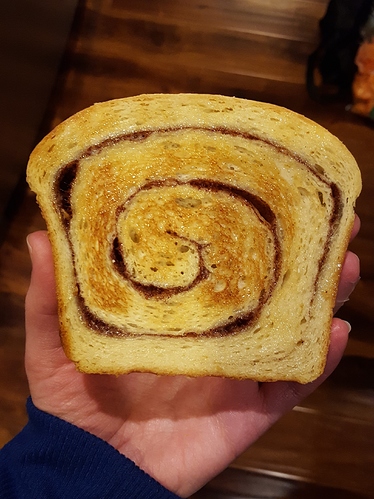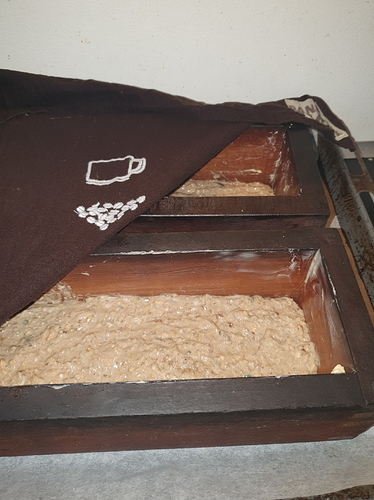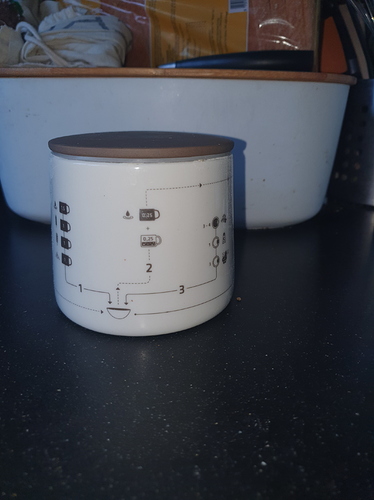It definitely depends on how you plan to use it. I started with a larger “traditional” starter (for lack of a better word). I just found most weeks I wasn’t really using it and I was throwing away a lot of starter. I just hated the waste.
It’s just me in the house, but I could always bake more often and bring it in to school, along with some of the homemade jam I need to use up. If I put it in the teachers’ room, it’ll disappear pretty quickly…
great topic!
and now I’m drooling over all of the action shots 
on a side note, I read a novel last year called Sourdough by R. Sloan, and really enjoyed it, esp the descriptions of the starter, bread, etc.
If you like light entertainment, you might enjoy it.
Same. I haven’t had much need for discard lately, so I’ve been keeping a smaller starter, too. I felt like my post was getting too long to throw that on top of the rest, and figured it would come up later. ![]()
For anybody looking for something to use up your discard…
I don’t ever put raisins in (just my preference), but I often replace them with small pieces of fresh apple. 
And in case anyone is wondering, the extra moisture from the apples has never negatively affected the bread.
After reading through some of the information at the links provided above, I’ll need to start my starter while I’m on February break. In order to make the small starter, I have to have a starter to start with. So, I’ll have to make a starter from scratch, which seems to require some very regular feeding for the first 5 days. I’ll be able to manage that when I’m home for a week! I’m a little nervous… I couldn’t keep a giga-pet alive, and I don’t do well with plants, so this will be a bit of a challenge for me 
Have you considered asking on free cycle if anybody in your area has a starter? That’s how I’ve always found water kefir grains and kombucha mothers. Fermenters usually can’t find homes for all their starters, I bet you get more than one offer.
Good news. I am the same way! ![]()
![]()
I hadn’t thought to ask around… I’m a little hesitant to get something from a random stranger 
But, we do have a farmers market that might have something…
Oh my carbs – heaven! Eons ago, our church made friendship breads and the starters lasted a good long while. I’m glad to find recipes for smaller starters and all the tips in here. Who can resist a crusty hunkalicious piece of bread, warm from the oven, slathered in melted butter, honey, or jam?
Fermenters are wierdos. The very best kinds of people 
Man, I knew better than ever opening this topic. Makes me want to cry, heh heh. I used to bake a lot of breads before the pains started in 2000, and sour dough was my favorite. There was one slight modification I had done once in a great while and called it “bitter bread”. I would let the dough sit for a bit longer during the first raising. Believe me, you don’t want to eat too much of that, heh.
Anyway, I have tried since then, but I guess I’ve lost my knack for getting the starter started the last few times, and the one time I had it going about 10 years or more ago, I just didn’t have the energy and strength to do it by hand.
I finally managed to get a decent rye starter after a false start, so I mixed up a dough and got it divided into my beloved wooden baking frames.
I use a rugkop, a hipster sourdough container I bought last year. It has the recipe on the side which is great if you’re me.
Now they just have to rise for six hours before baking.
You bake in wooden pans? Tell me more please!
They’re frames rather then pans, with open bottoms and tops.
I’ve had them for a couple of years now and they work really well with rye doughs.
I prep them with butter before loading them up with dough and then bake at a slightly lower temperature for slightly longer.
You have to season them with oil to begin with, quite a lot really, but now they just slide right off the loaves.
That is pretty cool. Are you using all rye or a combo of rye and wheat? We are not supposed to eat wheat for a few months, figuring out some digestive issues. Rye is ok though. I would like to find a reliable recipe because tiny loaves that last a day or two cost $4 at the store!
The ones I tend to bake do have some wheat in them, but I can probably dig up a recipe without, if you’d like?
Fair warning though, I’m a Dane. Rye bread is the national food stuff so it might differ from what you’re used to.
I would love your recipe. I am sure to enjoy it too as right now we are eating pumpernickel Dimpflmeier bread that is completely black and so unlike regular bread. I do like all of their 100% rye breads but they are so pricey, I would like to try at home.
I’ve done this before.
Pure rye, no add-ons.
It’s a two day recipe.
Day 1
0.5 litres rye sourdough
1.5 kg rye flour
1.5 litre lukewarm water
4 tablespoons salt
Mix everything
Let it stand at least 12 hours
Day 2
1 kg steel cut rye (if that’s a thing? Cut up the essentially)
2 deciliters of lukewarm water
Mix thoroughly (using a stand mixer)
The dough will be quite wet.
Remember to put some aside for your next batch of sourdough.
Fill two or three tins and make sure to smooth the surface and prick them with a fork out a knitting needle.
Let it rise for 4-5 hours.
Bake at 175 C for 90 minutes. Turn the oven off and let them stand for 45 minutes.
Don’t cut till the following day.
Bookmarked, thank you so much!


